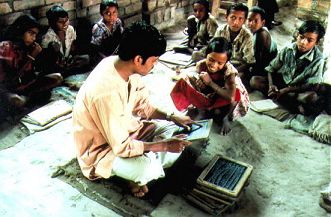Editorial
Greetings to all our readers. As you will see, EENET continues to strive towards facilitating conversations and focusing on issues of inclusion and exclusion worldwide. This newsletter concentrates on meeting one of EENET’s objectives: to provide a network that includes the concerns and experiences of those who work in a wide variety of fields. With this in mind, we have made a conscious effort to collect and share articles which reflect the concerns of individuals and organisations who work in issues of poverty, disability, ethnicity and gender exclusion.
The particular focus of this issue of the newsletter is on ‘attitudes’. Attitudinal change is seen as an important part of any type of transformation. Reflecting the attitudes of different stakeholders in the form of short concise articles has not been simple. The aim was to ask people whose attitudes had changed to tell their own stories, because in many cases others do so on their behalf.
The challenge lay in putting forward examples of changes in attitudes and the process through which these changes occurred. We know that attitudes do not change as a result of ‘fix all’ prescriptions or through another’s will to change the way we think, the way we work and interact. Therefore, the process cannot be forced and it calls for some sort of willingness and participation for the process to begin and be effective.
Another challenge lies in the fact that attitudinal change cannot be fully expressed in numbers or statistics. It was therefore necessary to identify specific examples and stories. In this, the third issue of the newsletter, we have encouraged those who felt comfortable writing or talking about attitudes and attitudinal change to do so. We still have a long way to go in terms of creating the appropriate support for people to ‘speak’ for themselves. Methods of communication, linguistic differences, geographical distance and our own lack of exposure are still barriers.
During the process of editing we found it difficult to find words and phrases which would mean the same to all our readers and which would not have negative connotations. For instance, people referred to as having learning difficulties are described differently in various parts of the world. We are trying to be sensitive in our use of language, but we realise that it is impossible to use words that mean the same to everybody. Please share with us what you think about this issue. Maybe you do not think it is important, or you may have experienced similar problems with language and labels. Whatever your experience we would like some feedback from you our readers.
Issue Editor: Memmenasha Haile-Giorgis with support from the EENET Team.
